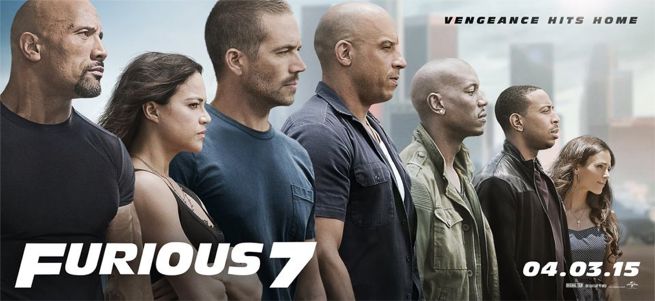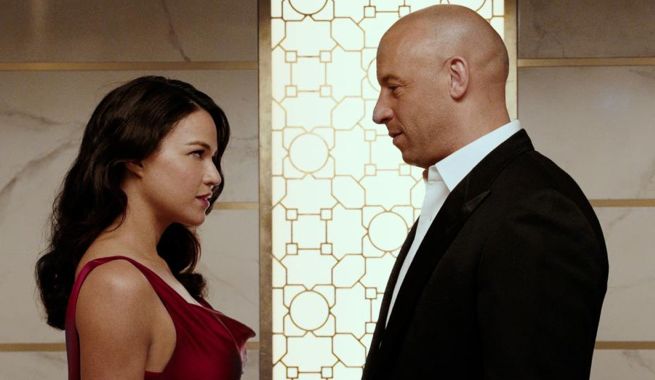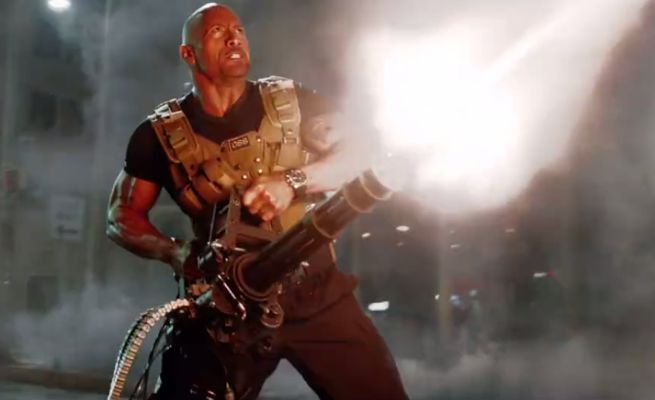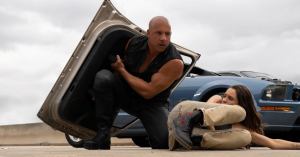Look, there’s no question, Marvel Studios has established themselves as the experts in franchise-building. Avengers: Age of Ultron’s $1 billion global box office revenue proves that. And they’re definitely the leaders in universe-building. As DC Entertainment, Valiant Entertainment, and others start trying to build their own universes, it’s natural that they look to Marvel for lessons learned.
But that’s what everyone is doing. So we thought we’d look to another franchise, one that has stealthily built a 2.3 billion dollar film series over the course of the last 14 years. They started from a fairly basic street-racing-meets-cops-and-robbers motif and evolved into a full-on superhero-style team action-adventure. With Furious 7 still fending off Age of Ultron as 2015’s highest-grossing film worldwide for 2015 ($1.47 billion), we wanted to take a look at five things that DC, Valiant, and other franchise-building hopefuls can learn from the family that rides together.
Videos by PopCulture.com
Find a Larger Theme
There are a million stories out there about the Hero’s Journey. There are plenty of movies that show a group coming together to overcome great odds. You can’t turn on the TV without finding ten films airing with bombastic action. So how do you set yourself apart? Let the movie have those aspects, but be about something else. The Furious franchise, especially the more recent installments, have had the clear (and by clear we mean, they tell you about 25 times per film) theme of “Family.” While no, you don’t have to hit your audience over the head with it, establishing a deeper theme changes the way people will view your individual films, and more importantly, your franchise as a whole. So pick a theme for your franchise, really play it out, give it time to grow, and then bring it on home.
Don’t Ignore Your Weaker Moments
Sometimes, when you’re building a multi-billion dollar franchise, you’re going to make a mistake; or if not a mistake, you’ll at least make a misstep. For the Fast and Furious franchise, that’s probably The Fast and The Furious: Tokyo Drift, the third film in the series. Certainly, monetarily, it was a misstep: it made only $62.5 mil domestic, compared to $238.7 mil for the best performer prior to the current film in the series, Fast & Furious 6. It’s also among the bottom of the barrel in critical response, and in audience score, according to aggregator Rotten Tomatoes (for the record, 7 is certified fresh with 82% Woo!).
But it was also the first of a quadrilogy of films by director Justin Lin, and that man had a plan (more on that in a moment). Rather than just sweeping the installment that had one of the stars in it for a total of about 35 seconds under the rug and ignoring it forever, Lin integrated it into the timeline. He made its story essential (and, upon subsequent viewings, much more fun, especially if you watch it as a Han spin-off film). So they made a misstep, but they took the good bits (Han, Han’s dramatic death), and made that part of a larger story that provides some extra motivation for their biggest, baddest effort yet. This is the way you handle a misstep: Own it, learn from it, fix it the best you can.
See Also: The Clone Wars in relation to the Prequel Trilogy
Follow a Vision
At Marvel Studios, you may have heard of a man named Kevin Feige. He’s been joined by fellow execs like Joe Quesada, comic book writers like Brian Bendis, and directors like Joss Whedon and the Russo Brothers in creating a unified vision that holds their franchise together.
Well, believe it or not, the Fast and Furious franchise demonstrates this important feature, too. Largely, this has been director Justin Lin, who directed four films, from Tokyo Drift to Fast 6, and writer Chris Morgan, who wrote all of those plus the seventh installment (James Wan directed it). They were also increasingly joined in creative direction by the stars of the films, especially Vin Diesel, who has served as a producer on each since the fourth. These guys had a clear vision for where the story was going, and built it up progressively over the last few movies. Furious 7 even has one heck of a tear-jerking recap in it to show just how much of this has worked so well together. Don’t be scared to get a “showrunner” or a “Jedi High Council” (everything is a Star Wars metaphor to me, sorry) and go with their plans – even when they Tokyo Drift you at first.
Don’t Rely on Star Power, But Don’t Waste It Either
Let’s face it, Vin Diesel, Paul Walker, Michelle Rodriguez – none of these actors were superstars before this franchise, but they’ve all had a lot of success since. It goes to show that you do not have to rely on so-called “stars” to get the job done. Franchise latecomer Gal Gadot, meanwhile, has moved into potential super-stardom with her Wonder Woman casting.
And then they booked The Rock.
Now, when you book someone like Dwayne Johnson, there is a temptation to just give him the ball and say, “go play!” But they really didn’t. It was still the Vin and Paul show (with their awesome supporting crew), Rock was just slowly integrated into it. Heck, even in Furious 7, his third film in the franchise, Rock probably has the least screentime of the main cast, including the slightly-less-marketable Ludacris and Tyrese. This installment also adds in Ronda Rousey and Kurt Russell, stars of their own respective fields, and used them perfectly (and scarcely enough), too. So don’t be scared to grab established players, but don’t forget everyone else in the meantime.
Above All, Don’t Forget to Have Fun!
This one is important, and likely most fans’ main reason for loving this franchise: it’s fun. Sometimes, it’s stupid, problematic fun – like the never-ending runway or the slowest possible military response times – but when the average viewer (and even many critics) is watching, they don’t care because they’re enjoying themselves too much. The action ramps up and gets crazier, the dialogue sometimes gets a bit hokier, and the characters skirt the caricature mark by just a smidge, but everyone has a good time at the movies. We, as moviegoers, can tell when actors are enjoying themselves, which informs us when directors are enjoying themselves, which lets us enjoy ourselves. Definitely take the premise and the rules of your world seriously, but then – you guessed it! – enjoy yourself!









